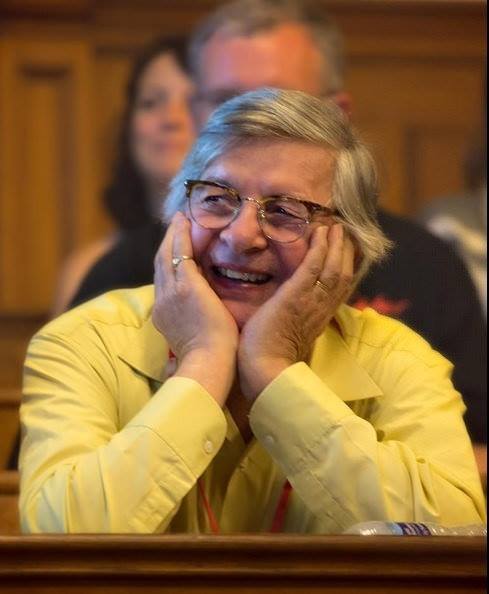
Thomas A. Underwood is Master Lecturer and Acting Associate Director of the College of Arts and Sciences Writing Program. He is a recipient of the Arthur G.B. Metcalf Cup and Prize for Excellence in Teaching, “the highest teaching honor awarded by the university.”
I have been trying hard to find a way to characterize my friendship with Martin Fido, who taught Boston University students for almost two decades and who passed away on April 2nd. Why did I love Martin so much? Was it a “bromance”? No – we were no Matt Damon and Ben Affleck. Could it, then, have been Martin’s Quakerism that drew me to him? That was a factor, for sure. I studied British literature at Haverford College, where Quaker Meetings were integral to students’ intellectual lives and communal ethos, and where my English professors, all of whom specialized in British literature, were Quakers. Martin reminded me of these professors in so many ways: articulate, opinionated, scholarly, textual, ethical, and loyal. And a polymath. But Quakerism cannot explain entirely my bond with Martin. Could it have been his Oxford degrees, the first with high honors? Martin wrote his thesis on Benjamin Disraeli under the tutelage of Lord David Cecil. The year Martin entered Oxford, Cecil edited Modern Verse in English with critic and poet Allen Tate, whose biography I spent ten years writing. Yes, Martin’s Oxford education – and the fact that he lived and breathed British literature – did draw me to him. To explain that draw, I have to disclose a great and painful failure of mine: going to graduate school at Harvard instead of Oxford. I came agonizingly close to achieving my Oxford dream. After winning the state nomination for a Rhodes Scholarship, I made it to Johns Hopkins University for the national finals, where I was grilled in a Spanish Inquisition-style interview by the commandant of West Point, the president of Goucher College, and other dignitaries, all of whom had been Rhodes Scholars themselves. Anyone who has survived a Rhodes Scholarship interview knows that the experience leaves one in tatters – and I felt relieved afterward to still have my wits if not the scholarship itself. Then, a few months later, I learned that the Rhodes Committee had designated me the number one alternate for a scholarship that year. But not a one of the winners dropped out and, leaving me high and dry, the twelve Rhodes Scholars crossed the Atlantic, as they do each year, on the QE2. I didn’t know then that I would eventually win something far more significant when I became close with Martin – for he had crossed the Atlantic in reverse direction and brought Oxford with him. I could pretend I was a kind of 13th Rhodes scholar to Martin! It is certainly no exaggeration to say that I was the tutee and Martin was my don. He was, after all, what was known as a “baby Don” at Oxford for three years when, in 1958, he was awarded the prestigious Andrew Bradley Junior Research Fellowship in English at Balliol College, Oxford, a fellowship Martin’s friend Sir Christopher Ricks, now William M. and Sara B. Warren Professor of the Humanities at B.U., held the preceding year.
Ultimately, however, my love for Martin had less to do with his extraordinary academic achievements than it did with his kindness, the twinkle in his eye, and with his unadulterated commitment to the English language.
Martin expressed this utter commitment to English both in his vibrant prose and in his remarkable voice. Yes – that voice! I first heard it when Professor Michael Prince, then director of B.U.’s Arts and Sciences Writing Program, liberated me from ten years teaching at Harvard and returned me to the program I helped him found. At the orientation for new faculty, Michael introduced Martin as an expert who would address us about oral communication assignments in our classes. Martin stood up. It was then I heard from this diminutive man a voice that, to me, expressed a love for the English language in and of itself, for its structure, for its sound, for its inflection. No one had Martin’s elocution. How could one not love listening to him? Both for his “received BBC pronunciation” and for his sheer learnedness. I remember once walking on Martha’s Vineyard with Martin as he shared his encyclopedic knowledge of Shakespeare, Dickens, and Wilde – about all three of whom Martin wrote well-received books. I was thinking: who needs songbirds on a nature walk when you are in the company of Martin? His voice was also known to a generation of Londoners for his “Leading Britain’s Conversation” radio show, “Murders after Midnight,” which ran to great acclaim for fourteen years.
Martin’s voice as an orator and his voice as a prose stylist were inextricably bound. It was when he was at work on his second book on Dickens and under a pressing deadline that he learned how to absorb and synthesize sources and then to draft by dictating into a tape recorder. Years later, he observed of this technique, “This really perfected my ability to think and speak in fully formed grammatically accurate sentences when required. And it established a habit of writing correctly, but colloquially: bringing the sound of the speaking voice to my prose.” His publishers stopped sending his manuscripts out for professional proofreading because doing so was simply not necessary. From academic essays to biographies of British literary figures to radio broadcasts to his legendary studies of Jack the Ripper, Martin was able to cross genres effortlessly. He was committed to the oral outcomes in our new general education curriculum long before there was a B.U. HUB. And there was sheer joy in Martin’s voice whenever he spoke of his family, taught or met students in his office, or greeted his colleagues. Writing Program lecturer George Vahamikos recalls, “The sound of his voice (with its occasional notes of the West Country of his birth) emanating from the neighboring office buoyed me up on afternoons when I was low. I’m sad that I won’t be lifted by it again. The world has lost some of its eloquence.” Indeed, Boston University has lost both a treasured teacher and an inimitable voice.























































































































Erin • May 1, 2019 at 8:16 am
Thank you for this lovely remembrance. I think it’s important to remember the impact that our friends and colleagues have on us as we go through life, and it’s even more important to share that impact because life can be so lonely and isolating. It’s good to hear about love between friends and colleagues as well as the shared love for literature, adventure, and discovery. These are the things we need to hear while we are alive because once we’re gone, it’s too late. Again, thank you for this remembrance. Everything you wrote here kindles my own love and fond memories of Martin as well as my other friends. I think I will go write them notes now to tell them how much the mean to me. 🙂
Letitia • Apr 22, 2019 at 7:40 am
I, I, I, me, me, me… I can only hope that when I shuffle off the mortal coil none of my “friends” will write such self-serving, egotistical bluster masquerading as a eulogy.
TU • Apr 30, 2019 at 7:52 am
Hi, Letitia. I can understand your reaction, as the piece had to be cut to a 100 words for publication in this forum — and the more personal material about his family was, in the interests of their privacy cut. No offense intended! Martin was an amazing human being, over whom we are all grieving here. Best wishes.